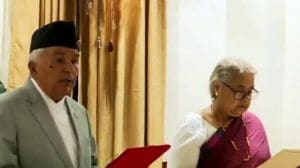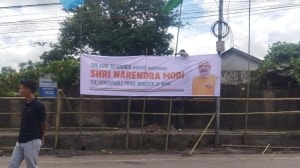The BJP has demanded an apology from Bihar Chief Minister Nitish Kumar for “deliberate insult” to Hindu sensibilities and “appeasement of minorities” for taking along his Minister of Information and Technology Minister for a visit to a Hindu temple, where the entry of people of other religions is barred.
RJD MLA Mohammed Israil Mansuri, 46, perhaps never expected to find himself in such a controversy. He won from Kanti (Muzaffarpur), a Hindu-dominated Assembly constituency with less than 20,000 Muslims, and makes it a point to attend religious functions in his area, be it jagrans by Hindus or Satyanarayan kathas.

On first hearing of the objections, including that non-Hindus were not meant to be let inside the ancient Vishnupad temple of Gaya, Mansuri said had been “honoured” to visit it. He was accompanying Nitish, who was visiting Gaya to assess preparations for the coming ‘Pitrapaksha Mela’, to commemorate ancestors.
Story continues below this ad
While the JD(U) has kept a tactical silence on the matter, RJD spokesperson Mrityunjay Tiwari accused the BJP of “making an issue out of nothing”.
For the RJD, Mansuri’s induction into its newly formed ministry with the JD(U), despite him being only a first-time MLA, achieved several purposes: ensured a non-Yadav face, accommodated a Muslim leader from Muzaffarpur, and signalled Pasmanda Muslims (Mansuri is one) that it has their interests in mind, at a time when the BJP is wooing them. Narendra Modi asked the party to focus on this depressed class among Muslims at a recent Hyderabad meeting.
Incidentally, Mansuri’s first party was the JD(U), and he joined it at the behest of Ali Anwar Ansari, a former JD(U) leader and head of the apolitical All India Pasmanda Muslim Mahaz.
Mansuri is believed to have left after waiting for about 15 years for a ticket from Kanti. Former RJD MP Raghuvansh Prasad Singh is said to have convinced Mansuri to cross over to the RJD before the 2020 Assembly polls.
Story continues below this ad
His victory from Kanti was as much a result of social combinations — two Bhumihar candidates dividing the dominant upper caste vote, and the Muslim, Yadav vote rallying behind him – as his acceptability among the Hindu electorate.

































